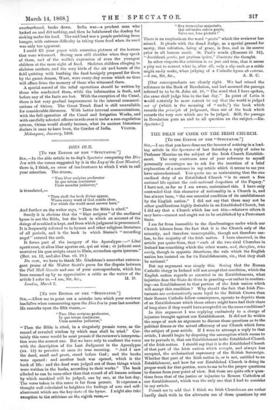[TO THE EDITOR OF THE "SPECTATOR."]
Sin,—Allow me to point out a mistake into which your reviewer has fallen when commenting upon the Dies kw in your last number. He remarks upon the fifth stanza,—
" Tura liber seriptns proferetur,
In quo totum continetur, Undo mundus judicetur,"
"Then the Bible is cited, in a singularly prosaic verse, as the record of revealed wisdom by which man shall be tried." Cer- tainly this verse would be most prosaic if the reviewer's interpreta- tion were the correct one. But we have only to confront the verse with the description of the Last Judgment in the Apocalypse (xx. 12) to perceive at once its true meaning. "And I saw the dead, small and great, stand before God ; and the books were opened : and another book was opened, which is the book of life : and the dead were judged out of those things which were written in the books, according to their works." The book alluded to can be none other than that record of all human actions by which mankind will be judged, one by one, at the last day. The verse taken in this sense is far from prosaic. It expresses a thought well calculated to heighten the feelings of awe and self- abasement which are the key-note of the hymn. I might also take exoeption to the oritieisin on the eighth versei—b
"Rex tromendae majestatis, Qui salvandos salvss gratis, Salsa me, tons pietatis !"
There is an emphasis on the word "gratis" which the reviewer has missed. It pleads with the dread Judge, as a special ground for mercy, that salvation, being of grace, is free, and in its source prior to all human merit. St. Paul's words (Romans iii. 24), " Justificati gratis, per gratiam ipsius," illustrate the thought.
In other respects the criticism is so just and true, that it seems a pity not to correct what is, after all, only a slip such as a critic might easily make, when judging of a Catholic hymn ab extern°.
[Our correspondents are clearly right. We had missed the reference to the Book of Revelation, and had assumed the passage referred to to be St. John xii. 48, "The word that I have spoken, the same shall judge him in the last day." In point of Latin it would certainly be more correct to say that the world is judged out of (which is the meaning of " uncle,") the book which records the principle of judgment, than out of the book which records the very acts which are to be judged. Still, the passage in Revelation puts an end to all question on the subject.—En. Spectator.]






























 Previous page
Previous page